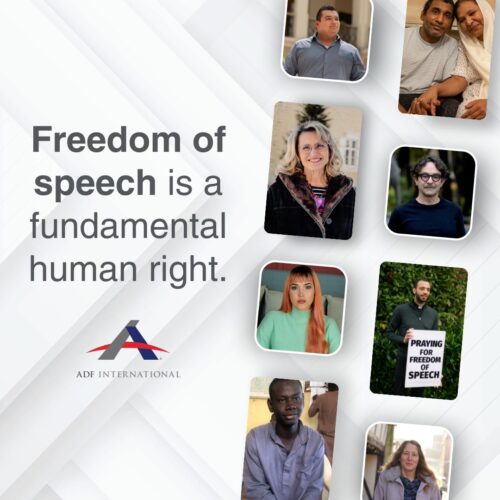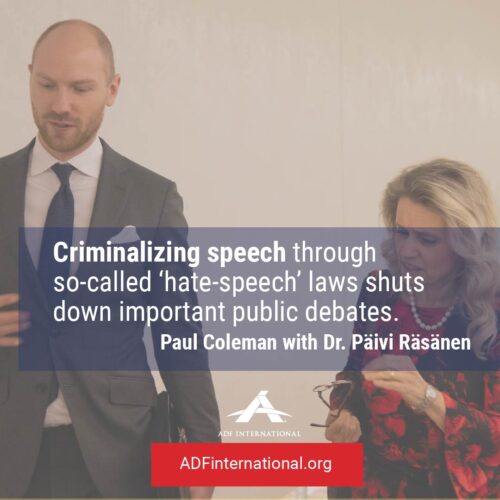Bible-tweet Case Reaches Final High-Stakes Battle at Finnish Supreme Court
Long-standing parliamentarian Päivi Räsänen stood trial a THIRD time on 30 October after expressing her Christian beliefs in a tweet.

Päivi Räsänen continues to be criminally prosecuted for expressing her Christian beliefs on marriage and sexuality in a 2019 tweet. Following multiple police interrogations, she was charged with “hate speech” in April 2021, alongside Lutheran bishop Juhana Pohjola. ADF International coordinates their legal defence, standing up for the free speech rights of every person.
Despite two unanimous acquittals, Päivi now faces the seventh year of legal proceedings. The landmark case was heard at the Finnish Supreme Court on 30 October 2025, following the State prosecutor’s appeal.
The prosecution is seeking tens of thousands of euros in fines and is demanding that Päivi’s publications be censored.
The Case of Päivi Räsänen
Päivi Räsänen has been a member of the Finnish Parliament since 1995 and was Minister of the Interior from 2011 to 2015. She is a medical doctor, mother of five children, and grandmother of twelve. She is also an active member of the Finnish Lutheran church.
Her ordeal began in June 2019 when she addressed the leadership of her church and questioned its official sponsorship of an LGBT event in a post on ‘X’ (formerly Twitter), accompanied by an image of a Bible text (Romans 1:24-27).
For this tweet, Päivi was charged as a criminal. In April 2021, the Finnish Prosecutor General brought three charges of “agitation against a minority group” against her under the country’s War Crimes and Crimes against Humanity law.
The police had also investigated a pamphlet that she authored for her church in 2004 titled: “As Man and Woman He Created Them” about sexuality and marriage.
Päivi was accused of “hate speech” for publicly voicing her opinion on marriage and sexuality in the church pamphlet she wrote, for comments made during a 2019 radio debate, and for the tweet.
Bishop Pohjola, the Chairman of the International Lutheran Council, was charged for publishing the pamphlet that Päivi authored. In its appeal to the Supreme Court, the prosecution dropped the charge regarding the radio debate.
In March 2022, Päivi was unanimously acquitted at the District Court of Helsinki. In August 2023, Päivi faced a second trial at the Finnish Court of Appeal.
Another unanimous ruling followed as the District Court’s acquittal was upheld. The court found that it “has no reason, on the basis of the evidence received at the main hearing, to assess the case in any respect differently from the District Court. There is therefore no reason to alter the final result of the District Court’s judgment.”
The Process as Punishment
The gruelling process didn’t end there. Despite the previous acquittals, the State prosecutor appealed the case. The stakes are higher than ever as Päivi prepares to stand trial a third time before Finland’s highest court.
ADF International has stood alongside Päivi as she faced the courts to fight for everyone’s right to freely share their beliefs. God willing, this marks the last, precedent-setting step in Päivi’s fight and we remain steadfast by her side.
In the view of the prosecution, Päivi’s beliefs, rooted in the bible and Christianity, are hateful and criminal. The prosecution has shown a clear determination to make an example out of her — to intimidate not only Päivi but every Finn and every person who dares to peacefully speak what they believe.
This committed civil servant never thought she would be put on trial for peacefully sharing beliefs in public.
“After my full exoneration in two courts, I’m not afraid of a hearing before the Supreme Court. Even though I am fully aware that every trial carries risks, an acquittal from the Supreme Court would set an even stronger positive precedent for everyone’s right to free speech and religion.”
- Päivi Räsänen, Finnish Parliamentarian and ADF International client
What’s at Stake?
Päivi’s case, still ongoing despite two acquittals, highlights the risks created by Finland’s current “hate speech” provisions. The Finnish law on “agitation against a minority group” has enabled the criminal prosecution of peaceful expression of deeply held beliefs.
As evidenced by this prosecution, overly broad “hate speech” laws leave citizens vulnerable to years of investigation and trial for peacefully expressing their beliefs. Laws intended to prevent incitement to hatred or violence should never extend to peaceful expression protected by the human right to free speech.
Furthermore, the precedent set here will reverberate across Europe. Under EU law, more specifically the Digital Services Act (DSA), decisions in one member state can directly influence what online speech is allowed throughout the entire Union.
Meanwhile, the European Commission is also pushing to make “hate speech” an EU-level crime, placing it alongside heinous acts like terrorism and human trafficking. If successful, this would force all member states to align their laws — drastically narrowing the space for free expression across Europe.
ADF International is committed to supporting Päivi and Bishop Pohjola in the pursuit of a final precedent-setting acquittal, in defence of the free speech rights of every person.
Support Messages from Around the World
February 23, 2026
January 27, 2026
congrats ! If you are travelling to Brussels, this would be a honor to meet you, as I am writing a book on this subject. see also my previous book … Read more
congrats ! If you are travelling to Brussels, this would be a honor to meet you, as I am writing a book on this subject. see also my previous book : https://www.amazon.fr/Politique-Wake-calls-Humanistes-Sociaux-chrtiens/dp/2874022896;
January 12, 2026
December 15, 2025
Verschrikkelijk, we zijn nú beland in een wereld waar de Bijbelse waarheid niet mag verkond worden!! Dit staat i/d BIJBEL. We leven nu I/d EINDTIJD. Het is belangrijk, dat we … Read more
Verschrikkelijk, we zijn nú beland in een wereld waar de Bijbelse waarheid niet mag verkond worden!! Dit staat i/d BIJBEL. We leven nu I/d EINDTIJD. Het is belangrijk, dat we massaal voor Paivi Rasanen BIDDEN!! 🙏🙏🕊️
November 24, 2025
Be strong, and go on!....if you resist!
November 20, 2025
Tack för att din kamp för kristna värderingar och att du utmanar censurivrarna i Finland och EU.
November 19, 2025
Always in our prayers. Do not be afraid!
November 19, 2025
Fil 4:6-8. The Lord bless you and keep you. Make His face shine upon you and be gracious to you. The Lord turn His face toward you and give you peace. And your family.
November 19, 2025
November 18, 2025
God Bless and keep up the good fight
November 18, 2025
May God bless you!
November 18, 2025
You are in my prayers

Finnish trial attorneys who have been in and out of court every day for years, said they didn’t think the Bible had ever been read out like that in a prosecution.

Paul Coleman
Executive Director, ADF International

'Hate Speech' FAQs
What is 'hate speech'?
‘Hate Speech’ is a term with no clear definition. While most will be familiar with the term ‘hate speech’, it is not used by any of the major international human rights treaties, and it has not been clearly defined by the European Court of Human Rights or any other international court.
National governments, technology companies, and international agencies use the term ‘hate speech’ in different ways in different documents. It is widely accepted that there is no universally agreed definition of ‘hate speech’ and most attempts rely on vaguely defined terms and subjectivity. Dangerously Ambiguous Laws Hundreds of draconian criminal speech laws exist on the statute books in Europe. In Austria, ‘insulting or belittling with the intent to violate the human dignity of others carries a two-year prison sentence.
In Greece, ‘insulting God in public’ carries a two-year prison sentence, and in Denmark, insulting the flag of the United Nations carries the same sentence. In Hungary, the State itself can be the victim of ‘hate speech’: inciting hatred against the Hungarian nation potentially carries a three-year prison sentence.
Similar laws exist across Europe, with enforcement focused on those who do not share the State’s views on certain politically charged topics. Consequently, in twenty-first-century Europe, public – and sometimes, even private – discussions on abortion, immigration, Islam, marriage and same sex relationships are high risk.
How are ‘hate speech’ laws a threat to democracy?
‘Hate speech’ laws hurt democracy because ‘hate speech’ laws rely so heavily on subjective and unclear terms (such as ‘insult’, ‘belittle’, and ‘offend.’) They are inconsistently interpreted and arbitrarily enforced. Generally, ‘hate speech’ is considered hateful by reference to the hearer, making it subjective and often with no or little regard for the content of the speech itself.
How do ‘hate speech’ laws threaten freedom of speech within the European Union?
Because of the vague and subjective nature of these allegations, the authorities necessarily have to select which prosecutions to pursue.
This generally results in the targeting of minority groups or opinions by those who disagree. In some cases, even the fact that what was spoken is demonstrably truthful is no defence. It is not just spoken speech which has attracted the attention of censors, but also activity online. Internet giants including Facebook, Twitter, Google and Microsoft have partnered with the European Commission to actively remove ‘hate speech’ online.
In practice, this has led to significant censorship on internet platforms, with very little insight into how each decision to remove user content is made, or how such decisions can be appealed.
Why is freedom of expression so important?
Freedom of expression is undoubtedly one of the most fundamental freedoms and features prominently in all major human rights treaties and national constitutions the world over.
Article 10 of the European Convention on Human Rights guarantees that everyone has the right to freedom of expression, and in the landmark case of Handyside v. United Kingdom, 6 the European Court of Human Rights recognized that: Freedom of expression constitutes one of the essential foundations of [democratic] society, one of the basic conditions for its progress and for the development of every man … it is applicable not only to ‘information’ or ‘ideas’ that are favourably received or regarded as inoffensive or as a matter of indifference, but also to those that offend, shock or disturb the State or any sector of the population.
Such are the demands of that pluralism, tolerance and broadmindedness without which there is no ‘democratic society’. The European Court has further stressed that States are under a positive obligation to create a favourable environment for participation in public debate by all persons concerned, enabling them to express their opinions and ideas without fear. speak freely.
What are the consequences of being charged with hate speech?
‘Hate speech’ laws shrink the boundaries of free speech and create a chilling effect on a variety of important conversations. Given the vague nature of ‘hate speech’, citizens look to avoid engaging in sensitive or potentially offensive topics for fear that this might be qualified as ‘hate speech’ and lead to a criminal investigation.
These ‘hate speech’ laws can ruin the reputation and livelihoods of individuals, even when they ultimately do not result in a prosecution. In this sense, the process becomes the punishment and others are deterred from making similar statements in the future.
Receive updates about Freedom of Speech and our Work
"*" indicates required fields









